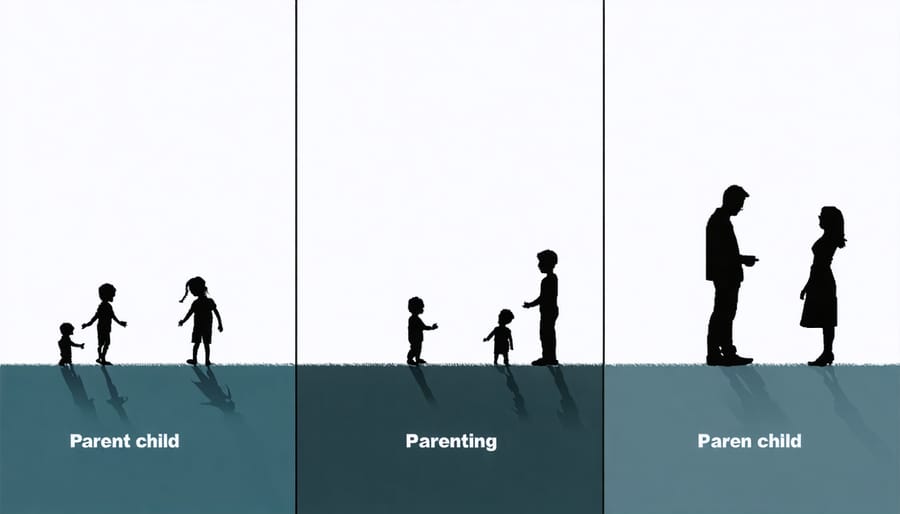Your parenting style shapes every aspect of your child’s development, from their emotional resilience to the crucial sleep and mental health connection. Research consistently shows that the way we parent falls into three distinct categories: authoritative, authoritarian, and permissive – each carrying its own set of implications for your child’s well-being.
Understanding these styles isn’t about finding the “perfect” approach – it’s about recognizing how our parenting choices impact our children’s development and making informed decisions that support their growth. Whether you’re struggling with bedtime battles or wondering how to set healthy boundaries, the science behind these parenting styles offers valuable insights for creating a nurturing environment where both parents and children can thrive.
Let’s explore how each style influences your child’s emotional development and discover practical ways to adapt your approach for better outcomes.

Understanding the Three Core Parenting Styles
Authoritarian Parenting: Rules Without Flexibility
Authoritarian parenting takes a strict, rule-based approach where children are expected to follow set schedules without question. Parents using this style often implement rigid bedtime routines with little room for flexibility or input from their children. While structure can be beneficial, excessive rigidity may lead to resistance and anxiety around sleep time.
Children raised under this style might struggle with self-regulation and independence in their sleep habits. They may follow rules out of fear rather than understanding, potentially developing sleep anxiety or refusing to go to bed when parents aren’t present to enforce rules.
Dr. Sarah Chen, a child psychologist, notes: “When children don’t have a say in their routines, they miss opportunities to develop their own healthy sleep patterns and coping mechanisms.” This can impact their long-term relationship with sleep and their ability to manage sleep independently as they grow older.
Authoritative Parenting: The Balanced Approach
Authoritative parenting strikes a perfect balance between setting clear boundaries and showing warmth and understanding. Parents who adopt this style maintain consistent rules while remaining responsive to their children’s needs. They explain the reasoning behind their decisions and encourage open dialogue, creating a supportive environment that promotes healthy sleep habits.
Children raised in authoritative households typically develop better sleep routines because they understand the importance of bedtime rules while feeling secure enough to express their concerns. These parents might establish a consistent bedtime schedule but remain flexible when special circumstances arise. They listen to their child’s sleep-related anxieties and work together to find solutions.
Research shows that this balanced approach leads to children who are more likely to self-regulate their sleep patterns and develop positive associations with bedtime. They feel confident in their ability to fall asleep independently while knowing their parents are there for support when needed.
Permissive Parenting: Few Boundaries
Permissive parenting is characterized by high responsiveness but few rules or boundaries. These parents often struggle to establish and maintain consistent bedtime routines, letting children decide when to sleep. While this approach may seem loving and flexible, it can lead to irregular sleep patterns and difficulties in self-regulation. Children might stay up late watching TV or playing games without limitations, resulting in sleep deficits that affect their daytime functioning and emotional well-being.
Dr. Sarah Chen, a child sleep specialist, notes: “Children actually thrive on structure. When parents don’t set clear boundaries around bedtime, kids often become overtired and stressed, making it harder for them to fall asleep naturally.” This creates a challenging cycle where both parents and children feel frustrated and exhausted.
Without consistent sleep boundaries, children may develop poor sleep habits that can persist into adolescence and beyond, potentially impacting their academic performance and emotional regulation abilities.
Impact on Sleep Patterns and Routines
Bedtime Struggles and Solutions
Each parenting style faces unique challenges when it comes to bedtime routines. Authoritarian parents often struggle with children who become anxious or resistant at bedtime due to strict rules and inflexible schedules. These children might experience difficulty falling asleep due to stress or may develop sleep anxiety.
Permissive parents typically face inconsistent bedtimes and frequent negotiations. Their children often stay up late, resist going to bed, and may frequently wake up during the night seeking attention. Without clear boundaries, these children might struggle to develop healthy sleep patterns.
Authoritative parents generally experience fewer bedtime struggles, as they maintain consistent routines while remaining responsive to their children’s needs. However, they might occasionally face challenges when balancing structure with flexibility.
To improve bedtime experiences, authoritarian parents can incorporate more warmth and flexibility into their routines. Permissive parents benefit from establishing consistent bedtime rules while maintaining their nurturing approach. Authoritative parents can continue reinforcing boundaries while acknowledging their child’s feelings and needs. Remember, small adjustments to your parenting approach can lead to significant improvements in your child’s sleep quality.
Creating Healthy Sleep Boundaries
Establishing healthy sleep habits is crucial regardless of your parenting style, but the approach may differ based on your preferred method. Authoritative parents typically set consistent bedtimes while remaining responsive to their child’s needs, creating a balance that helps children feel secure. They might establish a calming bedtime routine while allowing some flexibility for special occasions.
Permissive parents often struggle with maintaining sleep boundaries, as they tend to give in to “just five more minutes” requests. While this approach may seem loving, it can lead to irregular sleep patterns and tired, cranky children. Setting gentle but firm limits can help create better structure without sacrificing warmth.
Authoritarian parents might enforce strict bedtimes without considering their child’s individual needs. While structure is important, incorporating some flexibility and listening to your child’s concerns can create a more positive sleep environment. Consider implementing a wind-down period where children can voice their thoughts and feelings before bed, helping them feel heard while maintaining necessary boundaries.


Mental Health Implications
Anxiety and Stress Levels
Research consistently shows that different parenting styles can significantly impact a child’s anxiety and stress levels. Children raised under authoritarian parenting often experience higher levels of anxiety, as the strict rules and high expectations create a constant state of pressure. These children may develop perfectionist tendencies and struggle with self-doubt, fearing they can’t meet their parents’ demanding standards.
In contrast, children of permissive parents might experience anxiety differently. While they face less direct pressure, the lack of consistent boundaries can leave them feeling insecure and uncertain about handling challenging situations. This uncertainty often manifests as social anxiety or difficulty managing stress independently.
The authoritative parenting style typically produces the most emotionally balanced children. By providing clear expectations while remaining responsive to their children’s needs, these parents create a secure environment where children learn healthy stress management skills. Studies show these children generally have lower anxiety levels and better emotional regulation abilities.
Parents should remember that their own stress levels can affect their children’s well-being. Managing parental stress is crucial for maintaining a balanced home environment. Children are highly attuned to their parents’ emotional states, and a calm, supportive approach helps reduce anxiety levels for everyone in the family.
Remember, it’s never too late to adjust your parenting approach to better support your child’s emotional well-being. Small, consistent changes in parenting style can lead to significant improvements in your child’s anxiety levels over time.
Self-regulation and Emotional Security
A child’s emotional development is deeply influenced by their parents’ approach to caregiving. Each parenting style creates a distinct emotional environment that shapes how children learn to manage their feelings and develop a sense of security.
Parents who adopt an authoritative style typically raise children with stronger emotional regulation skills. These children learn to identify and express their feelings appropriately because their parents validate their emotions while setting clear boundaries. For example, when a child is upset, authoritative parents acknowledge the feeling while helping them find constructive ways to cope.
In contrast, children of authoritarian parents often struggle with emotional expression. The strict, punishment-focused environment can lead them to suppress their feelings or express them through anger. These children might feel less secure in their relationship with their parents and hesitate to share their emotional experiences.
Permissive parenting can result in children who have difficulty managing strong emotions independently. Without consistent guidance on emotional regulation, these children might become overwhelmed by their feelings or struggle to develop appropriate coping mechanisms.
Dr. Sarah Chen, a child psychologist, notes: “The most emotionally secure children often come from homes where parents create a safe space for emotional expression while maintaining reasonable boundaries. These children learn that their feelings matter but also understand the importance of managing them appropriately.”
Remember, it’s never too late to adjust your parenting approach to better support your child’s emotional development. Small, consistent changes in how you respond to your child’s emotions can make a significant difference in their emotional security and self-regulation abilities.
Finding the right parenting style isn’t about strictly adhering to one approach, but rather about understanding your child’s unique needs and adapting accordingly. Remember that what works for one family may not work for another, and that’s perfectly okay.
Consider starting with small adjustments to your current parenting approach. If you tend to be very strict, try incorporating more warmth and flexibility while maintaining clear boundaries. If you’re naturally permissive, work on establishing consistent rules while keeping your nurturing spirit.
The key is to maintain open communication with your child and stay attuned to their responses. Watch for signs that your approach is working: improved behavior, better emotional regulation, and stronger parent-child bonds are positive indicators.
Don’t be afraid to seek guidance from child development experts or family therapists if you’re struggling to find balance. They can provide personalized strategies based on your family’s specific dynamics.
Above all, be gentle with yourself as you navigate this journey. Good parenting isn’t about perfection – it’s about showing up consistently with love, understanding, and a willingness to grow alongside your child.







